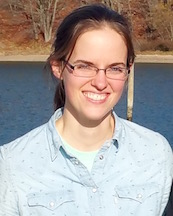Student Spotlight: Allison Truhlar

June 2, 2017
What is your area of research?
I’ve pursued multiple lines of research while at Cornell. In my discipline, I study E. coli adaptations for survival in agricultural soil, as well as greenhouse gas emissions from residential septic systems. I also conduct research on my teaching, and I am currently interested in student engagement in online chats.
What inspired you to choose this field of study?
I strive to do work that has a positive impact on the world around me. I was specifically drawn to the Soil and Water Lab because of its diverse and highly applied research on identifying, quantifying, and mitigating environmental pollutants. My desire to have a positive impact is not limited to the natural environment—it extends to my teaching as well. I started to measure the effectiveness of various teaching techniques in order to best serve my students.
Why is this research important?
For my E. coli research, I am specifically considering how different methods of manure application to the soil impact both the expressed and genomic differences in pathogenic E. coli strains. This will provide another piece of information to farmers looking to balance pathogen management with other considerations like manure storage and nutrient management.
My measurements of greenhouse gas emissions from residential septic systems represent some of the first measurements of this kind. They increase our understanding of the costs and benefits of using this form of decentralized wastewater treatment, as it becomes more prevalent in the United States.
Finally, my research on using different interventions to improve student engagement in online chats is important first and foremost for the course I teach. In addition, it directly adds to a national and international conversation on how best to provide online education to a growing number of students.
How has your background influenced your scholarship?
My undergraduate experience at Cornell greatly shaped my interests. I had the opportunity to participate in a number of research experiences both on and off campus that got me hooked on fieldwork and exploring the natural world. My current research on E. coli actually started during my senior year at Cornell! Another formative experience was my involvement with the Learning Strategies Center. I tutored introductory chemistry for three years, and discovered how much I enjoyed working with students and sharing my knowledge.
I understand you’ve been involved in some of CIRTL’s programming. Can you please elaborate on your participation in these programs?
I first got involved with CIRTL at Cornell through the Introduction to Evidence-Based Undergraduate STEM Teaching MOOC. Since then, I’ve participated in a number of CIRTL at Cornell’s programs including the Scholarship of Teaching and Learning program, the Inclusive Teaching Institute, ALS 6014: Theater Techniques for Enhancing Teaching and Public Speaking, and the CIRTL at Cornell Certificate program, which funded my travel to present at a national Teaching as Research conference.
What are the benefits of participating in teaching professional development programs like these while in graduate school?
While I knew I liked working with students when I applied to graduate school, I quickly learned that one-on-one tutoring is not the same as lecturing, leading a lab section, or managing an online course. These tasks required specific skills, and the CIRTL MOOC was really the first time I thought about how to structure a lecture, an assignment, or even an entire course, so that students get the most out of it. I also appreciate how many of the CIRTL at Cornell programs encourage graduate students to leverage their skills as researchers to further improve their teaching. As someone who’s become increasingly curious about how students learn during my time in graduate school, CIRTL at Cornell has provided me with both the training and support needed to pursue a serious research program in the area of education research.
Why did you choose Cornell to pursue your degree?
I knew my advisor, Dr. Todd Walter, and the department from my time as an undergraduate at Cornell. I value the flexibility to pursue my own research agenda, and my advisor has been incredibly supportive of this. Under his guidance, my dissertation includes one chapter on my teaching-as-research project.
What’s next for you?
I just accepted a combined postdoc and lecturer position at Cornell. I will have the opportunity to continue improving the online course I’ve now TA’d for four semesters, as well as begin new research with the New York State Water Resources Institute. I especially look forward to learning more about their outreach and education efforts, and figuring out research projects that can support their goals in these areas.
Any advice for incoming graduate students?
Your advisor is possibly the single greatest variable controlling your grad school experience. Communication with your advisor is key. Make sure s/he knows what you’re interested in, both research project and career-wise, and keep them up-to-date if those interests change over time. Also, make sure you’re both on the same page when it comes to research expectations. Does your advisor want to see certain deliverables on a certain timeline? Does s/he want you to be in the lab or office at specific times, or for a specific amount of time? Is s/he okay with you participating in programs outside the lab (like CIRTL at Cornell)? As simple as this sounds, many stories of breakdowns in advisor-advisee interactions include some component of miscommunication.
Interview by Sally Kral, communications and outreach assistant in the Graduate School
